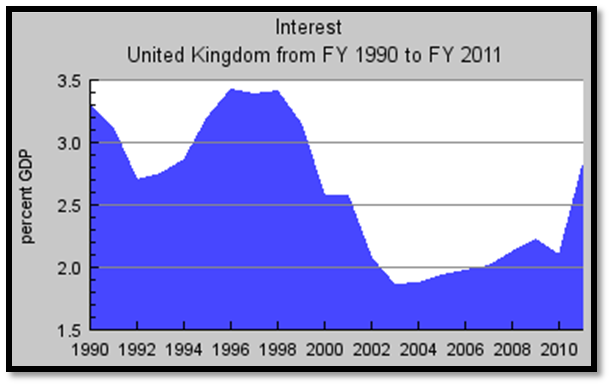 By Éoin Clarke
By Éoin Clarke
Us lefties won’t admit it but the one part of Keynesianism that in our weak moments does put the eebie jeebies up us, is the interest payable on the debt we accrue through running up deficits to get the economy growing.
When George Osborne chimes that £50bn will be spent in 2011-12 on ‘servicing the debt’, I gulp. It seems an extraordinary amount of money. But having taken some time to think about it, to put it in context and to examine the history of servicing the UK debt, one need not be unduly alarmed at the figure.
The UK is set to spend £710bn in 2011-2. The debt payments will constitute around 7% of total government expenditure. And whilst in raw terms £50bn is the highest interest payment the UK has ever made, it is significantly less in percentage terms than what John Major’s government were paying between 1992-7. (Source: UK Treasury Budgets (Red book[s]) 1997-2011)
In Gordon Brown’s first budget, debt interest payments made up over 9% of total government spending. To be exact, debt interest was 30% higher as a portion of total government spending in 1998 than it is today.
This need not even be a problem. When Clement Attlee’s government was achieving growth of 10%+ in the 1940s, debt as a proportion of government spending was over 10%. So the next time a growth denier hits you with the debt interest argument, be sure to refer them to the graph above.
Also, when Gordon Brown is accused of spending too much during the good years, one can see that Brown performed admirably in reducing John Major’s debt interest payments to less that 5% of total government spending. Not quite the spendthrift we are led to believe.
Some have said that this was only achieved because Brown spent more. But I include a graph below that shows debt interest payments as a proportion, not of spending, but of GDP. As you can see, this data is even worse for the Tories.

Source: www.ukpublicspending.co.uk
Éoin Clarke edits The Green Benches, where this was originally posted.




More from LabourList
‘Labour won’t stop the far right by changing leaders — only by proving what the left can deliver’
‘Cutting Welsh university funding would be economic vandalism, not reform’
Sadiq Khan signals he will stand for a fourth term as London Mayor